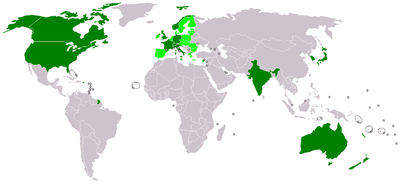Human Frontier Science Program
The Human Frontier Science Program (HFSP) (Frontière humaine, in French) is a program, based in Strasbourg, France, that funds basic research in life sciences. HFSP is supported by 13 countries and the European Union. Nobutaka Hirokawa has been its President and Chair of the Board of Trustees since 2012.[1]

| Abbreviation | HFSP |
|---|---|
| Location |
|
Key people | Nobutaka Hirokawa(President & Chair of the Board) |
History
In 1986 a feasibility study was carried out by leading Japanese scientists under the auspices of the Japanese Prime Minister's Council for Science of Technology, to explore possible means to encourage international collaboration in basic research. Discussion was expanded to include scientists from the G7 summit nations and the European Union, resulting in the "London Wise Men's Conference" in April 1987, which endorsed the suggestion. Prime Minister Yasuhiro Nakasone of Japan proposed the Human Frontier Science Program at the Venice Economic Summit in June 1987. The Economic Summit partners and the Chairman of the European Community welcomed the initiative and activities aimed at implementing it were started. The implementing body, the International Human Frontier Science Program Organization (HFSPO) was established in 1989 and the secretariat was founded in Strasbourg, France.[2] Since 1990, more than 6000 awards have been made to researchers from over 70 countries. [3][4] Of these, 25 HFSP awardees have gone on to win the Nobel Prize for their scientific work.[3][5]
Funding

HFSPO receives financial support from the governments or research councils of Australia, Canada, France, Germany, India, Italy, Japan, Republic of Korea, New Zealand, Norway, Switzerland, UK, USA, as well as from the European Union (contributes on behalf of the non-G7 EU members[6]). The funds are combined into a single budget and are allocated to awards on the basis of HFSPO's own peer review system on the sole basis of scientific excellence.
Funding programs
Research Grants are awarded for novel collaborations involving extensive collaboration among teams of scientists working in different countries and in different disciplines. Two types of grants are available: Young Investigator Grants and Program Grants.[7]
Postdoctoral Fellowships are available for scientists who wish to work in foreign laboratories, with emphasis on individuals early in their careers who wish to obtain training in a different field of research. Fellows who return to their home countries are eligible to apply for a Career Development Award.
Cross-disciplinary fellowships are intended for postdoctoral fellows with a Ph.D. degree in the physical sciences, chemistry, mathematics, engineering and computer sciences who wish to receive training in biology.[8]
HFSP funding programs start at the postdoctoral level. No support is available for undergraduate or PhD students.
HFSP peer review
International peer review is a cornerstone of the procedures used in making awards. There is one review committee for Fellowships and one for Research Grants each consisting of 24 to 26 scientists. They have a broad international representation of scientific experts and each reviews applications in all scientific fields supported by the HFSP. This ensures that awards are made according to international scientific standards and the presence of reviewers from many countries minimizes geo-political bias. Extensive research is carried out into the expertise and reputation of potential members before appointment to ensure maintenance of the highest standards. The evaluation procedures are under constant review and the HFSP secretariat works closely with the members of the review committees and the Council of Scientists to ensure that all applications are assessed fairly and thoroughly.[9][10]
HFSP Nakasone Award
In 2010, HFSP established the HFSP Nakasone Award to honour former Prime Minister Yasuhiro Nakasone of Japan for his vision in launching HFSP as a program of support for international collaboration and to foster early career scientists in a global context. The HFSP Nakasone Award is designed to recognise scientists who have undertaken frontier-moving research, including technological breakthroughs, which has advanced biological research. Both senior and junior scientists are eligible and peer-recognised excellence is the major criterion. The award can be made to an individual or a team of scientists. Award winners receive an unrestricted research grant of USD 10,000, a medal and personalised certificate. The award ceremony is held at the annual HFSP Awardees Meeting where the award winners are expected to deliver the HFSP Nakasone Lecture.[11]
Recipients of the Award:
- 2019 Michael N. Hall (Biozentrum University of Basel, Switzerland), " for the 'discovery of the master regulator of cell growth, the target of rapamycin (TOR) kinase".
- 2018 Svante Pääbo (Max Planck Institute for Evolutionary Anthropology, Leipzig, Germany), "for his discovery of the extent to which hybridization with Neanderthals and Denisovans has shaped the evolution of modern humans".
- 2017 David Julius (University of California, San Francisco, USA), "for his discovery of the molecular mechanism of thermal sensing in animals".
- 2016 Emmanuelle Charpentier (Max Planck Institute for Infection Biology, Berlin, Germany) and Jennifer Doudna ( University of California, Berkeley, USA), "for their seminal work on the CRISPR-Cas9 system".
- 2015 James J. Collins (Center of Synthetic Biology of Boston University, USA), "for his innovative work on synthetic gene networks and programmable cells".
- 2014 Uri Alon (Weizmann Institute of Science, Rehovot, Israel), "for his pioneering work in discovering network motifs".
- 2013 Stephen Quake (Stanford University, USA), "for his pioneering work that advanced biological measuring techniques".
- 2012 Gina G. Turrigiano (Brandeis University, USA), "for her pioneering work on homeostatic plasticity in the nervous system"
- 2011 Michael Elowitz (California Institute of Technology, USA), "for his pioneering work on gene expression noise".
- 2010 Karl Deisseroth (Stanford University, USA), "for his pioneering work on the development of optogenetic methods for studying the function of neuronal networks underlying behavior".
HFSP Journal
Launched in October 2006, the HFSP Journal aims to foster communication between scientists publishing high quality, innovative research at the frontiers of the life sciences.[12] Peer review is designed to allow for the unique requirements of such papers and is overseen by an Editorial Board with members from different disciplines. The HFSP Journal offers its authors the option to pay a fee to make their research articles Open Access immediately upon publication. For other articles, access is limited to subscribers for the first 6 months after publication, but access is free thereafter.
The HFSP Journal ceased publication in July 2010 and was bought by the scientific publisher Taylor & Frances, to be re-launched in 2011 as “Frontiers in Life Science.[13]
In 2015 the HFSP reported that the former journal name had been hijacked in an apparent attempt to fraud researchers into publishing an apparent scam journal.[14]
References
- "Professor Nobutaka Hirokawa elected as President of HFSPO - Human Frontier Science Program". www.hfsp.org.
- "History - Human Frontier Science Program". www.hfsp.org.
- "Annual report 2014" (PDF).
- "Awards Archive - Human Frontier Science Program". www.hfsp.org. Archived from the original on 2011-02-19. Retrieved 2011-02-22.
- "HFSP and the Nobel Prize - Human Frontier Science Program". www.hfsp.org.
- "About Us - Human Frontier Science Program". www.hfsp.org.
- "Research Grants - Human Frontier Science Program". www.hfsp.org.
- "Postdoctoral Fellowships - Human Frontier Science Program". www.hfsp.org.
- "Review procedures - Human Frontier Science Program". www.hfsp.org.
- "Fellowship Review Procedure - Human Frontier Science Program". www.hfsp.org.
- "HFSP Nakasone Award - Human Frontier Science Program". www.hfsp.org.
- "HSFP Journal". Archived from the original on 2008-08-27. Retrieved 2010-01-12.
- "Frontiers in Life Science". www.tandfonline.com. Retrieved 2019-04-28.
- "Announcements | Human Frontier Science Program". www.hfsp.org. Retrieved 2019-04-28.
As of this edit, this article uses content from "Human Frontier Science Program", which is licensed in a way that permits reuse under the Creative Commons Attribution-ShareAlike 3.0 Unported License, but not under the GFDL. All relevant terms must be followed.
Further reading
- "Can the West contribute more to Human Frontiers?". Nature. 386 (6621): 95. 1997. Bibcode:1997Natur.386Q..95.. doi:10.1038/386095a0. PMID 9062169.
- Schiermeier, Q (2000). "Human Frontier repatriation boost". Nature. 407 (6807): 934. doi:10.1038/35039703. PMID 11069153.
- Abbott, A (1993). "EC pays up for Human Frontiers Program". Nature. 366 (6454): 392. Bibcode:1993Natur.366..392A. doi:10.1038/366392b0. PMID 8247136.
- Swinbanks, D (1993). "Human Frontiers Programme wins art prize". Nature. 365 (6441): 4. Bibcode:1993Natur.365....4S. doi:10.1038/365004c0.
- Swinbanks, D (1993). "Japan increases share of Human Frontier awards". Nature. 362 (6421): 579. Bibcode:1993Natur.362..579S. doi:10.1038/362579c0. PMID 8464505.
- Swinbanks, D (1993). "Cuenod will head Human Frontier programme". Nature. 361 (6408): 101. Bibcode:1993Natur.361..101S. doi:10.1038/361101b0. PMID 8421504.
- Swinbanks, D; Abbott, A (1992). "Human Frontiers looks for leader in Europe; US wavers". Nature. 359 (6396): 567. Bibcode:1992Natur.359..567S. doi:10.1038/359567a0. PMID 1406981.
- Ole Bernsen, Niels (1992). "Scope of Human Frontiers". Nature. 359 (6391): 99. Bibcode:1992Natur.359...99O. doi:10.1038/359099a0. PMID 1522915.
- Swinbanks, D; Mervis, J; Abbott, A (1992). "Conflict over scope of research splits Human Frontier programme". Nature. 358 (6387): 527. Bibcode:1992Natur.358..527S. doi:10.1038/358527a0. PMID 1501696.
- "Human Frontiers in rough water". Nature. 358 (6387): 525. 1992. Bibcode:1992Natur.358Q.525.. doi:10.1038/358525a0. PMID 1501695.
- Swinbanks, D (1991). "Human Frontiers gets extension". Nature. 351 (6329): 683. Bibcode:1991Natur.351..683S. doi:10.1038/351683c0. PMID 2062359.
- Swinbanks, D; Pool, R (1991). "Human Frontier effort gets promise from NIH". Nature. 350 (6314): 97. Bibcode:1991Natur.350...97S. doi:10.1038/350097a0. PMID 2005969.
- Swinbanks, David (1988). "Human Frontiers Program to go international in Switzerland". Nature. 334 (6180): 281. Bibcode:1988Natur.334..281S. doi:10.1038/334281a0.
- Swinbanks, David (1988). "Human Frontiers gets a mention in Toronto". Nature. 333 (6176): 790. Bibcode:1988Natur.333..790S. doi:10.1038/333790c0.
- Swinbanks, D (1988). "Human Frontiers Science Program on table at Toronto summit". Nature. 333 (6173): 488. Bibcode:1988Natur.333..488S. doi:10.1038/333488a0. PMID 3374595.
- Swinbanks, David (1987). "Human Frontiers Program seeks international help". Nature. 330 (6150): 683. Bibcode:1987Natur.330..683S. doi:10.1038/330683b0.
- Swinbanks, David (1987). "Japan's Human Frontiers project stays in the doldrums". Nature. 328 (6126): 100. Bibcode:1987Natur.328..100S. doi:10.1038/328100a0.
- "What human frontiers?". Nature. 326 (6108): 2. 1987. Bibcode:1987Natur.326R...2.. doi:10.1038/326002b0.